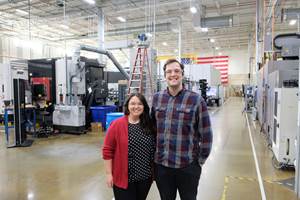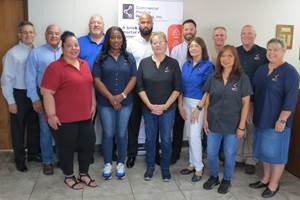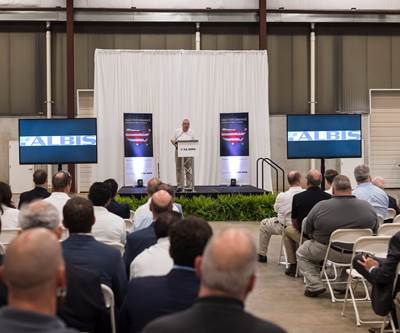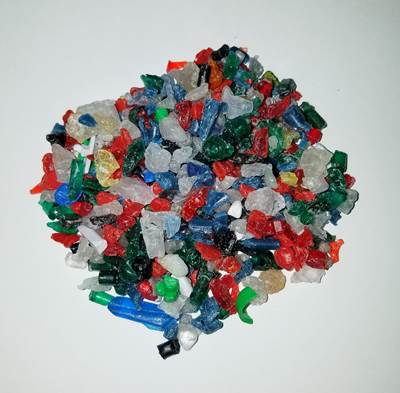How Two Compounders Step Up to Meet Rising Demand for Recycle Content
Two compounders that specialize in engineering thermoplastics for technical applications discuss what they are doing to meet demands for PCR compounds.
Two compounders of engineered thermoplastic compounds with additional expertise in offering both prime and near-prime post-consumer recycle (PCR) are beefing up their efforts to provide processors and brand owners/OEMs with recycled-content compounds.

Custom UL-FR and (fl) rated for outdoor applications: Star Plastics’ new ReStart PC with 35% PCR content.
Recycling’s ‘Star’
Star Plastics, Ravenswood, W. Va., which since 1998 has specialized in custom-formulated prime PC, FR-PC, ABS and PC/ABS alloys, last year launched the ReStart line of UL-recognized, high-performance compounds that contain 35% to 50% recycle content.
Notes Chuck Hoop, director of sales, “We started to see an uptick in interest about three years ago, but have seen the biggest increase in the past year. The consumer is helping drive recycled content in electronics. Consumers are pushing brands, who are pushing OEMs to embrace sustainability and help drive that interest throughout the supply chain.”
Adds Molly Ritchie, marketing and brand manager, “At the end of the day, the OEMs are setting the cost of the final product, and they want to satisfy their customers who want sustainable products, so they’re more likely and able to choose a higher-cost recycled-content material. The sustainability aspect can also be a differentiator of their brand in the market.” She notes that OEMs and processors are typically driven by a combination of price and quality. “Many aren’t willing or ready to take the ‘risk’ on recycled-content materials if they cost the same as like-prime.”
Adds Doug Ritchie, Star Plastics president and CEO, “Most of the companies we work with who have sustainability initiatives at this point have ‘skin in the game’—they’re the ones that end up successful with it. Sometimes they don’t know what exactly they want regarding their sustainability initiatives, but they’re willing to learn from compounders like us on the front lines to help them shape their sustainability plans.”
Brandon Humphreys, purchasing specialist, explains what Star Plastics is doing to meet this demand: “Generally speaking, it’s a matter of increasing diversity in our supply streams of recycled raw material from different sources, qualifying the material coming out of those feed streams, and building long-term partnerships with those companies. We gather many grades of material from a range of different suppliers, including collectors, manufacturers, MRFs, and recyclers. We choose our feed streams strategically based on our experience with their materials, whether their properties line up with our expectations, whether they process cleanly, and the general quality of it. Quality is key, and we hold our partners and suppliers to those same standards.”
Star Plastics processes material in two North American facilities and one in Shandong, China, or with a partner company, depending on the raw material. Says Hoop, “When it comes to feedstock generation, North America continues to be different from Asia. The key is being able to create the high-quality feedstocks needed on a local basis. For example, the cost to ship PCR material from Asia to North America makes it difficult to produce cost-effectively. So it has to be local relative to the continent on which you are compounding the finished goods. We can support many of our U.S. companies that have manufacturing facilities in Asia by producing material locally to their facilities at our Shandong site.”
Doug Ritchie maintains that Star has the ability to “clean up” materials to increase value, and can make any level of recycled-content compounds, even prime-performing products, according to customer demand.
“There’s a bigger cost to not doing anything, wasting usable materials, sending them to landfills.”
Passing the Tests
On the matter of quality control, Humphfreys says the testing process starts when the truck doors open and the material is offloaded. “We have a full-service lab at both North American facilities and a custom ERP system that allows us to track each box and pound all the way through the system. We continue the testing process through each step, including right before it leaves our plant.”
Hoop says that all of the company’s compounds are tested from “top to bottom,” ranging from their recycle-based ReStart products to their StarPrime and ValuPak lines of products. “It all starts with the base feedstocks—whether they will be used for a certified recycled-base feedstock or made from prime materials. Our system allows us to know what is in every box of material when it comes in the door and test it for targeted properties. This could include melt flow, Izod impact, color, surface quality, flame retardancy. We test during production for key properties and color in every box of material produced. And at the end of production, we post-blend each lot and check again to see that the properties still stay in range of our specification.”
The Star Plastics team concedes that recycled feedstock has its challenges. Says Humphreys, “You have to be mindful of incoming specifications of the material, as you don’t have control over how it was produced or processed before it comes to you. A big part of preventing challenges is through thorough feedstock testing. We certify our recycled materials similar to the way prime manufacturers would, if not more. The more data points we collect about a material stream, the easier it is to track, manage, and use it successfully as a feedstock.”
Adds Humphreys, “Our technologists have years of experience, allowing us to do more with the recycled content as feedstock, like custom colors and tight specifications for high-performance applications, as well as to overcome any issues like cycle times that may arise—again, through formulation.”
Adds Hoop, “For a molder making a part, there is no difference in processing. Our experience shows that customers have very little tolerance for variability, and that is one of the cornerstones of Star’s successes: lot-to-lot consistency.”
“For a molder making a part, there is no difference in processing.”
The Price of Sustainability
Hoop notes that recycle-content compounds sometimes come with a higher price tag due to the additional formulation and testing required to produce them. The ReStart line, for example, is equal in both price and performance properties to the company’s like-prime compounds. Hoop notes, “We also have products with solid performance and wider specifications that are less expensive depending on the application. Our recycled-content materials cross our entire product offer, each with its own specifications to meet customer requirements.”
Certain customers are willing to pay more, the Star Plastics team states. Molly Ritchie notes that brand owners specifically tend to be more open to going above-and-beyond in their sustainability measures. Still, Hoop notes that the “old-school thinking” that recycled material is “cheap”—or at least cheaper than prime—is still more prevalent than one might think.
But, Molly Ritchie notes, “There’s a bigger cost to not doing anything, wasting usable materials, sending them to landfills. The cost we all are paying now—investing in recycling infrastructure, learning how to innovate with recycled-content, adding value to these materials—will be less than the cost we’ll pay down the line when the problem is even larger due to inaction. And it comes with the knowledge that we are problem-solving and providing a cleaner, more sustainable future.”
Adds Doug Ritchie, “The real key for any company to successfully incorporate recycled-content—or any sustainable alternative for that matter—into its products is to be open and involved with the process. OEMs need to be involved in the process and understand what they’re doing and why.” He noted that cutting-edge OEMs have embraced recycled content and understand the potential constraints involved, with successful ones incorporating it into new products and making it into a positive selling point.
Albis’ Venture into PCR Compounding
Since 2017, Albis Plastics Corp., Duncan, S.C., has been producing prime technical thermoplastic compounds under the Alcom brand, and a broad range of custom-engineered Altech compounds based on nylons 6 and 66, PP and various other polymers. Stefan Fuhlendorf, president and CEO, says that in the past few years, the Albis group has invested heavily in the area of recycling by adding capacity and making several acquisitions globally, including most recently the purchase in 2016 of the plastics recycling activities of William Barnet Polymers & Son in Spartanburg, S.C. Albis had been located in Texas, where it imported prime compounds from its European facilities. In 2017, Albis started up its first U.S. compounding in Duncan, including recycling activity. In Duncan, Albis repelletizes and markets primarily post-industrial raw materials, and uses them in compounding its Altech Eco recycled-content line of engineered compounds.
Fuhlendorf says the company has seen demand for recycled compounds increase steadily since Albis established its manufacturing presence in the U.S. “We are positioning ourselves in the market as a solution provider offering both prime and recycled resins. Due to our strong expertise and the quality of our products, we have been able to build ourselves a name in the industry as a reliable source for recycled compounds.” Through acquisitions in the recycling field, he adds, “We have sufficient access to raw material and enough capacity in place in order to meet the increasing demand of our customers.”
Fuhlendorf says Albis is seeing increased demand from OEMs across various industries, which is being pushed down the value chain to the processor level. “Of course, price is still a driver, but there appears to be a much stronger focus on manufacturing sustainable products as a result of the overall discussion in society and by legislators regarding sustainability, protection of the environment, and climate change.” He notes that the company’s Altech Eco compounds with near-prime quality are widely used by well-known manufacturers and OEMs in industries such as automotive, electrical/electronic, building/construction and appliances.
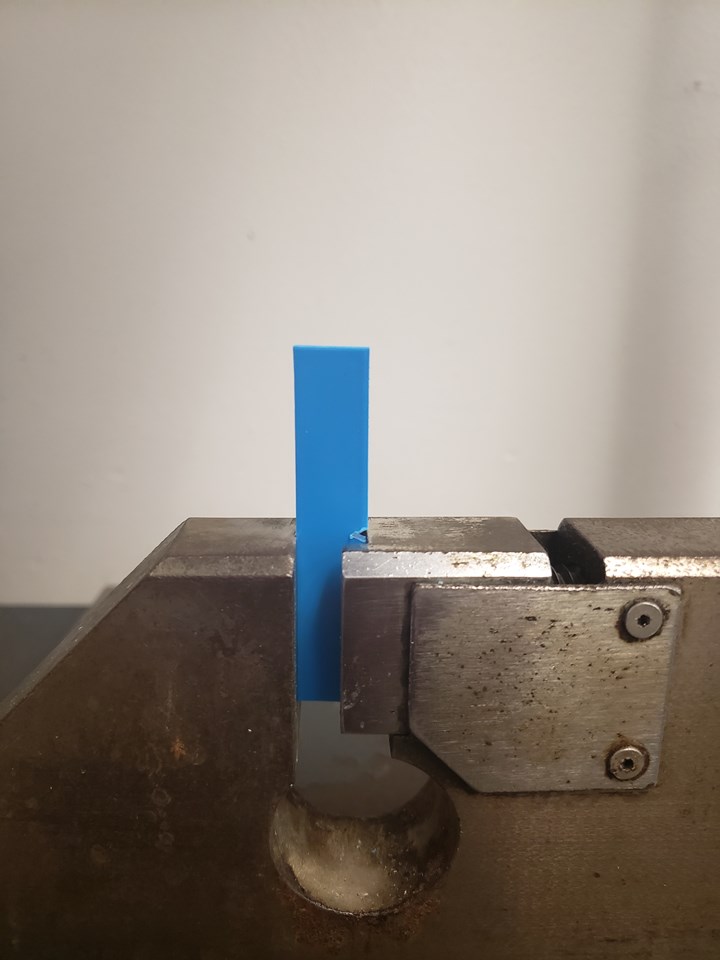
Extensive testing—such as melt flow, notched Izod impact (pictured), color, surface quality, flame retardancy—ensures quality of Star Plastics’ ReStart PCR-content PC.
Fuhlendorf explains Albis’ feedstock strategy: “We specialize in nylon 6 and 66 recycled compounds. They are based on post-industrial fiber feedstock, which we get as a byproduct directly from fiber manufacturers. These raw materials have very high quality and consistency to begin with.” To repelletize this material, Albis uses a proprietary vacuum system to remove moisture and residue and melt filtration to remove solid impurities. The recycled pellet is then used as feedstock for Altech Eco and IQ (Industrial Quality) compounds, which are manufactured in a separate building at the same location.
According to Fuhlendorf, Albis’ state-of-the art compounding facility in Duncan is certified according to IATF 16949, which covers its entire portfolio of prime and recycled compounds.
“The quality of our recycled compounds is ensured by a sophisticated qualification process of our raw-material suppliers, the careful selection of feedstocks, narrow production tolerances and stringent quality control of the finished product,” she says.
And, he notes, the result is price-competitive, “Generally speaking, our recycled compounds aren’t more costly; we can usually offer our customers a certain price advantage compared with prime materials, even with our Altech Eco compounds, which possess a near-prime quality.”
“Generally speaking, our recycled compounds aren’t more costly.”
Fuhlendorf continues, “Offering a price advantage for recycled versus prime compounds is still an important criteria in the B2B market, but sustainability starts playing a bigger part for our customers—i.e., there is a growing demand for products with a better CO2 footprint and near-prime quality.” He notes that they now receive RFQ’s (requests-for-quote) from customers inquiring not only about the technical specifications and price but also the CO2 footprint of a material.
“In addition, we have customers who expect that in the future, pricing will be based more on CO2 footprint, which will most likely result in higher prices for prime materials. We have recently had an independent, renowned institute in Germany do the math for us: As part of a study, the Süddeutsches Kunststoffzentrum (SKZ) calculated a savings of roughly 11 kg of CO2e (CO2 emission) per kg for an Altech Eco nylon 6 or 66 compound versus a comparable prime compound.”
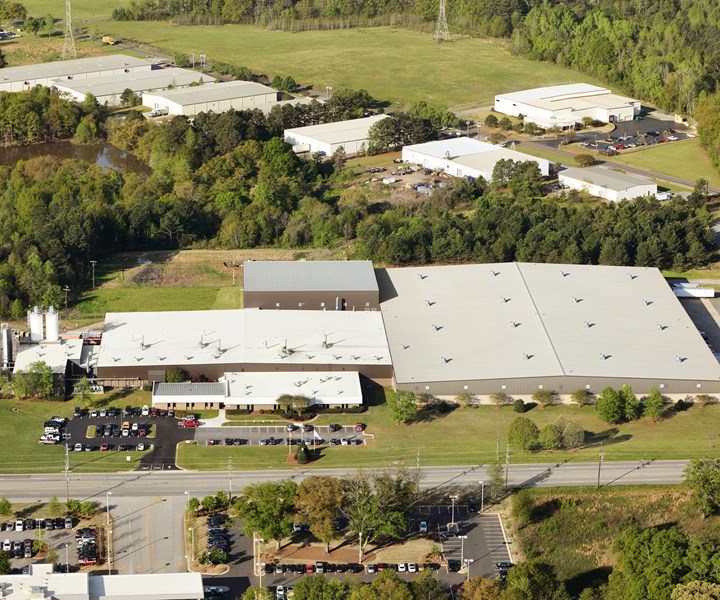
Albis America’s Duncan, S.C. plant produces Altech Eco reycled-content compounds based on nylons 6, 66, PP and PET.
Fuhlendorf maintains that Albis’ recycled compounds can normally be processed without the need to make major processing adjustments or modify or add extra equipment. He says, “Due to the high quality and consistency of our raw materials, and the extra precautions we are taking in our manufacturing process, the risk of contamination (e.g., with metal) is reduced to a minimum.”
Related Content
The Importance of Mass Balance in Chemical Recycling
Approaches to mass balance can dramatically impact calculations of recycled content.
Read MoreScaling Up Sustainable Solutions for Fiber Reinforced Composite Materials
Oak Ridge National Laboratory's Sustainable Manufacturing Technologies Group helps industrial partners tackle the sustainability challenges presented by fiber-reinforced composite materials.
Read MoreInside the Florida Recycler Taking on NPE’s 100% Scrap Reuse Goal
Hundreds of tons of demonstration products will be created this week. Commercial Plastics Recycling is striving to recycle ALL of it.
Read MoreNPE2024 Wrap-Up: Sustainability Dominates Show Floor News
Across all process types, sustainability was a big theme at NPE2024. But there was plenty to see in automation and artificial intelligence as well.
Read MoreRead Next
Albis Plastics Starts Up New Compounding Plant
Prime technical compounds are now being manufactured by Albis in the U.S.
Read MoreMaterials: PC, ABS and Blends with Up to 50% Recycled Content for Broad Range of Applications
Star Plastics’ new ReStart product line boasts a sustainable materials solution that delivers quality parts and reduced waste.
Read MoreAlbis Plastic and Barnet Launch Recycling Joint Venture
The new Albis Barnet Polymers company will recycle, repelletize, and market post-industrial raw material, and use them to compound Albis' componds.
Read More
























